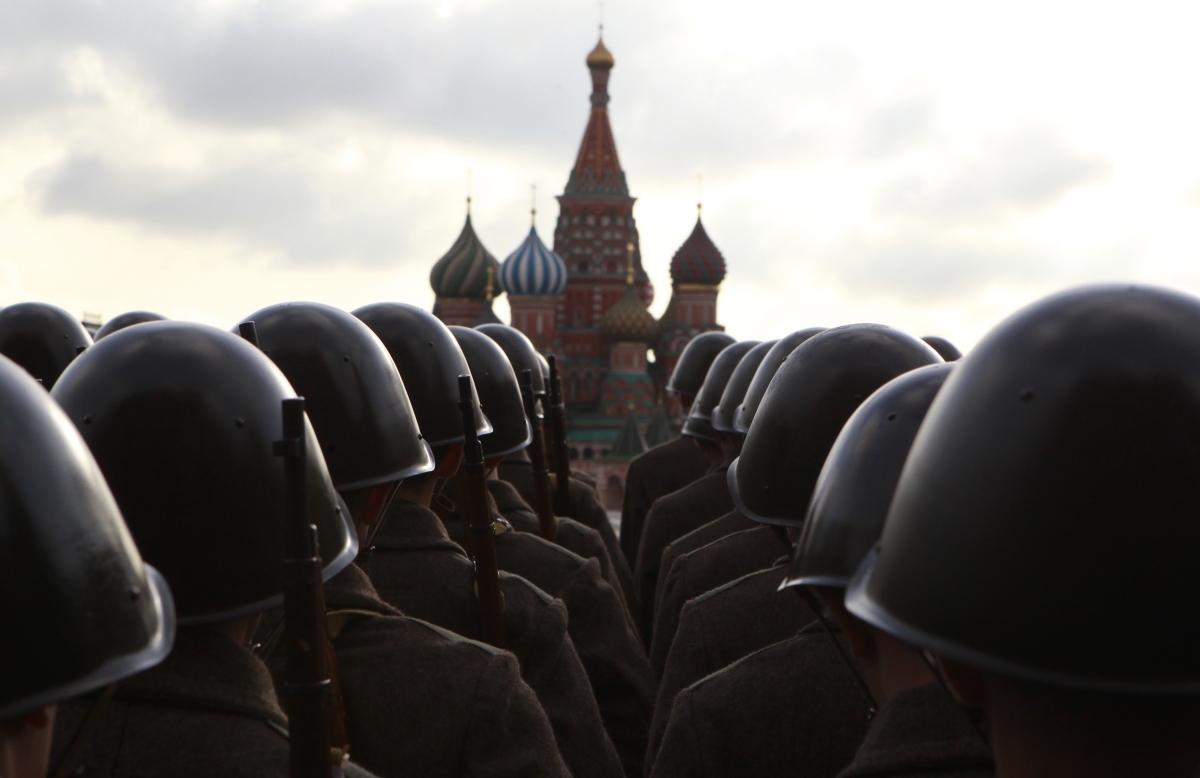Ukraine Crisis: Russia Ready to go to War over Crimea
- By Jack Moore , February 21, 2014 11:59 AM GMT
- 116 +
Russian servicemen, dressed in historical uniform, take part in a military parade rehearsal in Red SquareReuters
A Russian government official has revealed that Russia would be willing to fight a war over the Crimea region of Ukraine and protect the large Russian population and its military assets there.
"If Ukraine breaks apart, it will trigger a war," the unnamed official told the Financial Times.
"They will lose Crimea first [because] we will go in and protect [it], just as we did in Georgia," the official continued.
Russian President Vladimir Putin has been publicly restrained about the Ukraine and sent Vladimir Lukin, a former diplomat and human rights commissioner, to Kiev as a mediator.
But analysts have pointed to the possibility of a repetition of the 2008 Georgia conflict when Russian troops and tanks invaded after the Georgian government launched an attack on the separatist region of South Ossetia. One hundred and fifty people died in the Russian action.
Russia is one of the few countries in the world to officially recognise the independence of South Ossetia and Abkhazia, and would be likely do so with the Crimea region should Ukraine divide.
The speaker of the Crimea parliament, Volodymyr Konstantinov, suggested that the Russian-majority region might secede from Ukraine if it splits in the event of a civil war.
"It is possible, if the country breaks apart. And everything is moving towards that," he told Russian news agency Interfax.
Ukraine's western region of Lviv has already reportedly declared independence from the central government.
Ukraine is a nation torn between Russia and the European Union, situated at the heart of the "shared neighbourhood" between the two blocs.
Approximately 21% of Ukraine's population is Russian and it holds deep cultural and historical links with modern Russia because of its Soviet history.
The region of Crimea lies on the northern coast of the Black Sea. Russia's massive Black Sea Fleet is stationed at Sevastopol and 60% of the region's population are ethnic Russians.
The Russian elite views Ukraine as part of the Soviet "sphere of influence" and sees the country as a potential bulwark against the growth of EU liberalisation.
"We will not allow Europe and the US to take Ukraine from us. The states [are] of the former Soviet Union, we are one family," a foreign policy official told the FT.
"They think Russia is still as weak as in the early 1990s but we are not."
Ukrainian President Viktor Yanukovych has claimed a deal to resolve Ukraine's political crisis has been reached with pro-European opposition leaders after the bloodiest day in the country's history since the Soviet era and footage emerging of government snipers firing on unarmed protesters.
BREAKING: Reports Russia Building Up Troops on Ukraine Border OBAMA WARNS RUSSIA..
DEBKAfile Exclusive Report February 24, 2014, 6:08 PM (IST)
Russian Units transferred to the Ukraine border
debkafile’s military sources report that units of the Russian forces which formed a steel ring around the Olympic Winter Games that ended in Sochi Sunday were flown and shipped Monday, Feb. 24 to Russian bases at the Ukrainian Crimean port of Sevastopol, as Moscow refused to recognize the legitimacy of the new authorities in Kiev.
Giant Russian Air Force transports and rapid deployment forces were placed on alert at the Rostov on-Don base east of the predominantly Russian-speaking southeastern Ukrainian town of Donetsk.
Russian military movements were also sighted near Belgorod, a Russian town 40 kilometers from the Ukraine border and north of its second largest town of Kharkov. There, too, most of the inhabitants are Russian speaking with a strong affinity to Moscow – in contrast to their European-oriented compatriots in the capital, Kiev.
These military movements were accompanied by sharp Russian rhetoric in Moscow’s first direct response to the tumult in Kiev and ouster of the pro-Russian President Viktor Yanukovych, against whom Kiev police Monday issued a warrant for mass murder.
Russian Prime Minister Dmitry Medvedev said Monday: “Today I see no legitimate Ukrainian partners for a dialogue. If people crossing Kyiv in black masks and Kalashnikov rifles are considered a government, it will be difficult for us to work with such a government," he said, calling it “the result of a mutiny.”
The prime minister spoke of a “real threat to our interests, and to our citizens’ lives and health.”
With these comments, the Russian leader laid down a pretext for Russian military intervention in Ukraine. It was Moscow’s response to the warning issued by US National Security Adviser Susan Rice Sunday, Feb. 23, that “it would be a grave mistake for Russia to send military force.”
An area emerging as a potential flashpoint in the Ukraine crisis is the Crimean peninsula in the south.
This territory and its port of Sevastopol was part of Russian imperial might from the 18th century until in 1954 when Nikita Khrushchev, an ethnic Ukrainian, transferred it to Ukrainian control – a step bitterly resented by Russians ever since.
When Ukraine broke away from the Soviet Union in 1991, it took Crimea with it. Moscow has since leased the strategically critical naval base as a deep-water port for the Russian Black Sea Fleet, with easy access to the Mediterranean. The lease is paid up to 2042. Ethnic Russians make up almost 60 per cent of the population, with Ukrainians and Crimean Tatars accounting for the rest. If Ukrainian turmoil continues and it faces a real threat of breaking up, Vladimir Putin may seize the opportunity to recover the peninsula. The Russian military force in Sebastopol was already beefed up Monday.





 Reply With Quote
Reply With Quote
Bookmarks